Our Big Prediction
This Could be One of the Exciting Opportunities for Investors
- Home
- Views On News
- Apr 15, 2023 - Sunil Singhania's Latest Portfolio Rejig: What's new?
Sunil Singhania's Latest Portfolio Rejig: What's new?
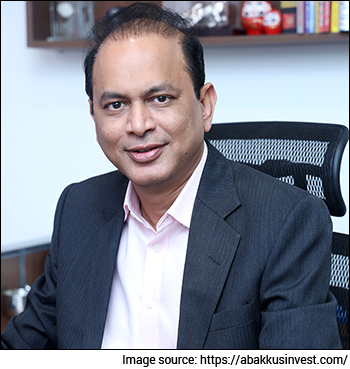
2022 witnessed a significant downturn for global equity investors, with most equity markets around the world delivering negative returns.
However, the Indian market held steady, outperforming most global indices.
Conversely, the current year 2023 has seen a shift towards rewarding those indices that were adversely impacted in the preceding year. While India has observed a decline of around 4%, the MSCI World Index has surged by almost 8%.
Investing in this volatile market can be both stressful and challenging. Amid these challenging times, imitating the investment portfolios of successful financial gurus is a popular strategy to outperform markets. One of them being Sunil Singhania.
The seasoned investor was busy reshuffling his portfolio recently as he trimmed his stake in two stocks while increasing his stake in four others.
Which stocks did Sunil Singhania cut down on and why?
#1 Tracxn Technologies
The latest shareholding pattern of Tracxn shows that Sunil Singhania sold 0.4% stake in the company.
The ace investor sold 0.4 m shares or 0.35% stake in the company, dragging his holding down to 1.3% from 1.6% in December 2022 quarter.
One reason for this could be that Tracxn being a new-age tech stock like Zomato and Paytm, has struggled on the bourses and is currently trading 24% below its listing price in October 2022.
Not just Zomato or Paytm but also stocks such as Delhivery and CarTrade Tech have fallen from the top.
The wealth destruction in these stocks is massive. Most investors, who didn't sell at the peak or after they were listed, are sitting on huge losses.
Also, even after reporting a 23% YoY rise in revenue to Rs 202.5 m and net profit jump of 480.4% to Rs 621 m, the stocks witnessed strong FII selling due to high valuation.
These are the kind of stocks that can fall even if the fundamentals improve just because their valuations are too high.
For more details, check out the Tracxn Technologies company fact sheet and quarterly results.
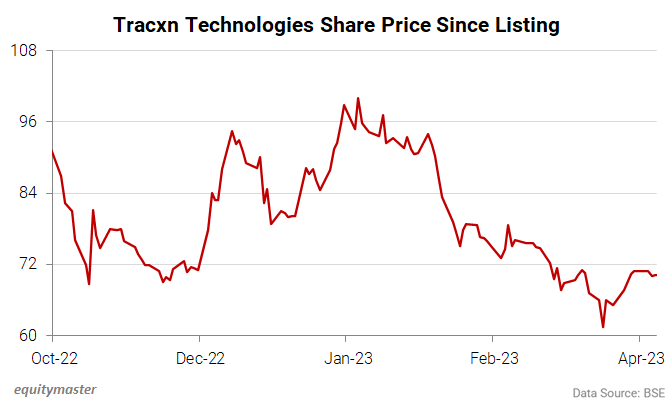
#2 Carysil
As of March 2023, the shareholding pattern of Carysil shows that Sunil Singhania has reduced 0.1% the stake in the company.
The ace investor sold 25,558 shares or 0.09% stake in the company, dragging his holding down to 6.05% from 6.14% in December 2022 quarter.
Initially, Sunil Singhania bought 1.7 m shares of Carysil in March 2021. He has reduced his stake in the company from 6.45% in March 2021 to 6.14% in December 2022.
This reduction can be due to a periodic slowdown in the export market due to higher-than-usual inventory levels maintained during the Covid period by customers.
Further, the channel destocking and the manufacturing cost headwinds also hindered the growth of the company.
For the September 2022 quarter, the company's revenue jumped 7.6% YoY to Rs 1.4 bn. On the flip side, the net profit for the quarter declined 30.2% YoY to Rs 120.5 m.
This decline in profit was due to an increase in total expenses of 12.6%.
Given the current global operating environment, the board has decided to postpone the expansion of an additional 200,000 capacity quartz sinks.
This expansion will take place in two phases, with 100,000 units in June 2023 quarter and the balance in December 2023 quarter.
For more details, check out the Carysil company fact sheet and quarterly results.
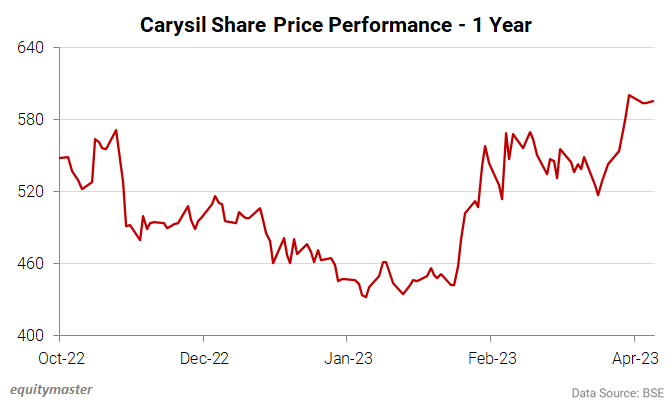
Which stocks did Sunil Singhania bet on and why?
#1 Technocraft Industries
The latest shareholding pattern of Technocraft Industries shows that Sunil Singhania has increased his stake in the company by 0.2%.
The investor bought 9,768 shares, or 0.23% stake, in the company, raising his stake to 3.2% from 2.97% in December 2022 quarter.
While we don't know why Singhania added shares of Technocraft Industries in the quarter under review, there are some reasons we can guess.
First, indicating its defensive characteristics, the stock outperformed the broader markets by gaining over 20% and reaching its 52-week high during a volatile trading session in March.
Additionally, Technocraft Industries reported strong financial performance for the first nine months of the financial year 2022-23, with an 11.2% YoY jump in revenue at Rs 4.9 billion (bn), a 33% YoY increase in net profit at Rs 873 m.
While its EBITDA (earnings before interest, taxes, depreciation, and amortisation) grew by 30% YoY to Rs 1.4 bn.
Further, with the strong tailwind in the sector, the company is set to benefit from the government's continued focus on infrastructure development.
For more details, check out the Technocraft company fact sheet and quarterly results.
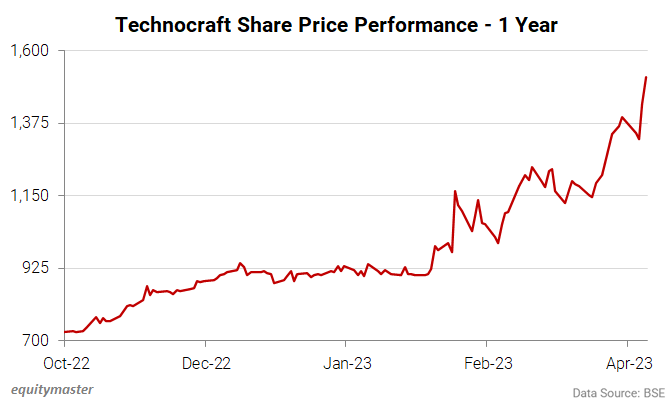
#2 Sarda Energy and Minerals
According to the March 2023 shareholding pattern of Sarda Energy and Minerals, Sunil Singhania has added 0.1% more exposure to this stock.
The investor bought 25,000 shares, or 0.07% stake, in the company, raising his stake to 2.2% from 2.1% in the December 2022 quarter.
Since his investment in March 2021, he has steadily invested in the company, increasing his stake from 1% to 2.2% in March 2023.
The bullish stance on the stock could be due to the company's expansion plan, as it received permission from the Chhattisgarh Environment Conservation Board for an expansion in the existing rolling mill to 2.5 m tons per annum from 1.8 tons per annum.
Despite an 8.9% YoY decline in revenue to Rs 9 bn and a 22% YoY decline in net profit to Rs 1.3 bn, the company is set to benefit from the sector tailwinds. The company is set to reap benefits from rising steel prices globally and the revival of the Chinese economy.
Steel prices have been going up in India for the last couple of weeks, partly driven by demand, because January to June is typically the peak season for steel consumption.
Also, the removal of export duty on steel products will help the metal producers pull up their profits by exploring more overseas markets.
For more details, check out Sarda Energy & Minerals company fact sheet and quarterly results.
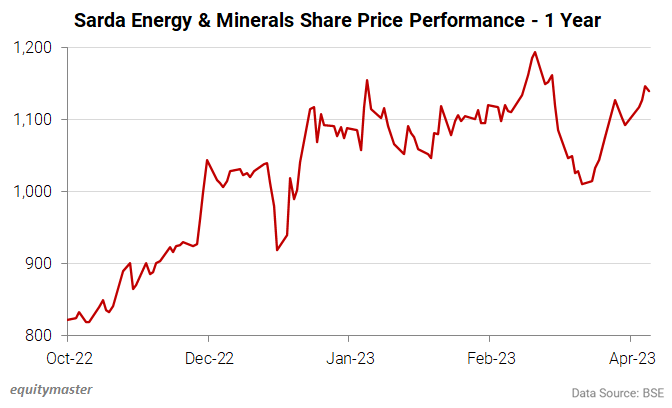
In addition to the aforementioned stocks, Sunil Singhania has marginally increased his ownership in HUL by 0.02% and in Rupa & Company by 0.1%.
To Conclude
While this approach might seem appealing, it has several potential drawbacks. A replicating investor may end up buying a stock at a much higher price than the successful investor, as the latter may have bought the stock much earlier when it was undervalued.
Also, their risk tolerance level, size of investment and investment horizon is often quite different from that of a retail investor. They may be able to take bigger risks and hold on to investments for a longer period of time.
Hence, blindly following their moves without considering one's own risk profile and investment goals can be risky.
While it might be tempting to follow the investment moves of successful investors, it is crucial to conduct thorough research and analysis before making any investment decision.
Investors should focus on investing in fundamentally strong companies that align with their individual goals and risk tolerance level, rather than blindly following these gurus.
Investment in securities market are subject to market risks. Read all the related documents carefully before investing
Out Now
3 High Conviction Stocks
Chosen by Rahul Shah, Tanushree Banerjee and Richa Agarwal
Report Available
Details of our SEBI Research Analyst registration are mentioned on our website - www.equitymaster.comDisclaimer: This article is for information purposes only. It is not a stock recommendation and should not be treated as such. Learn more about our recommendation services here...
FAQs
Which are the best value investing stocks in India right now?
As per Equitymaster's Stock Screener, here is a list of the best value investing stocks in India right now...
These companies have been ranked as per their PE (Price to Earnings) ratio and PB (Price to Book Value) ratio. The lower the ratios, the more undervalued the stock is.
They also have low debt and high return on equity.
Note that, there are various other parameters you should take into account before investing in any company such as promoter holding etc. Sustained research must not be compromised despite the positive odds.
Can value investing make you rich?
Yes. However, note that value investing is not a get-rich-quick scheme, it's a buy-and-hold strategy.
Once you manage to find a fundamentally strong company that is priced lower than its actual value, you must buy and hold for a long term.
This will help you ride out the volatility in stock prices and avoid the pitfalls that come with trying to time the market.
How does Warren Buffet value stocks?
Warren Buffett evaluates stocks based on his value investing philosophy.
Buffett looks for companies that provide a good return on equity over many years, particularly when compared to rival companies in the same industry. He also reviews a company's profit margins to ensure they are healthy and growing.
Besides this, he focuses on companies that provide a unique product or service that gives them a competitive advantage. He also focuses on companies that are undervalued, ie. have a margin of safety.
Here's a list of Indian stocks that could qualify per Warren Buffett's criteria...


Equitymaster requests your view! Post a comment on "Sunil Singhania's Latest Portfolio Rejig: What's new?". Click here!
Comments are moderated by Equitymaster, in accordance with the Terms of Use, and may not appear
on this article until they have been reviewed and deemed appropriate for posting.
In the meantime, you may want to share this article with your friends!